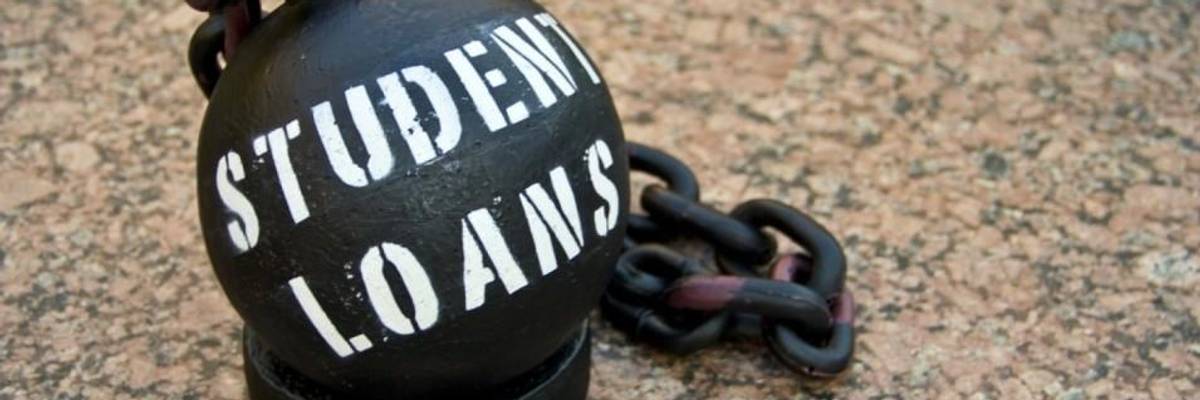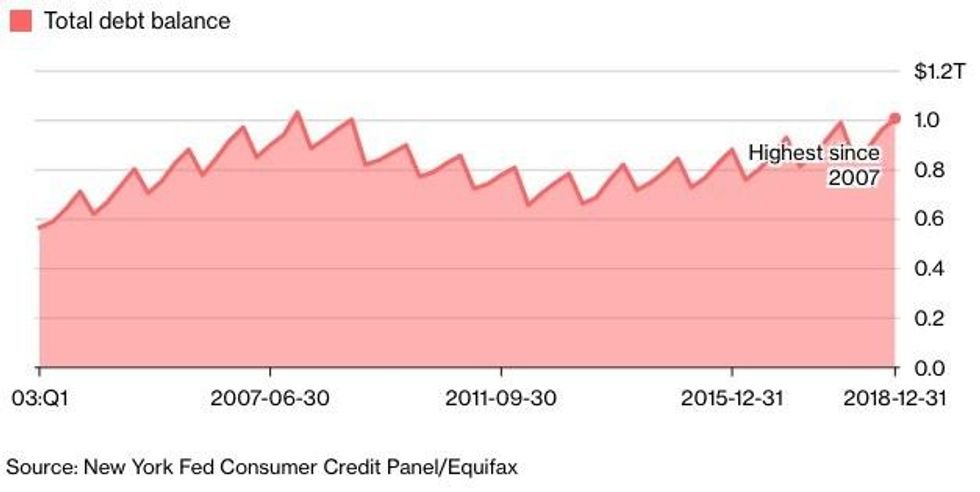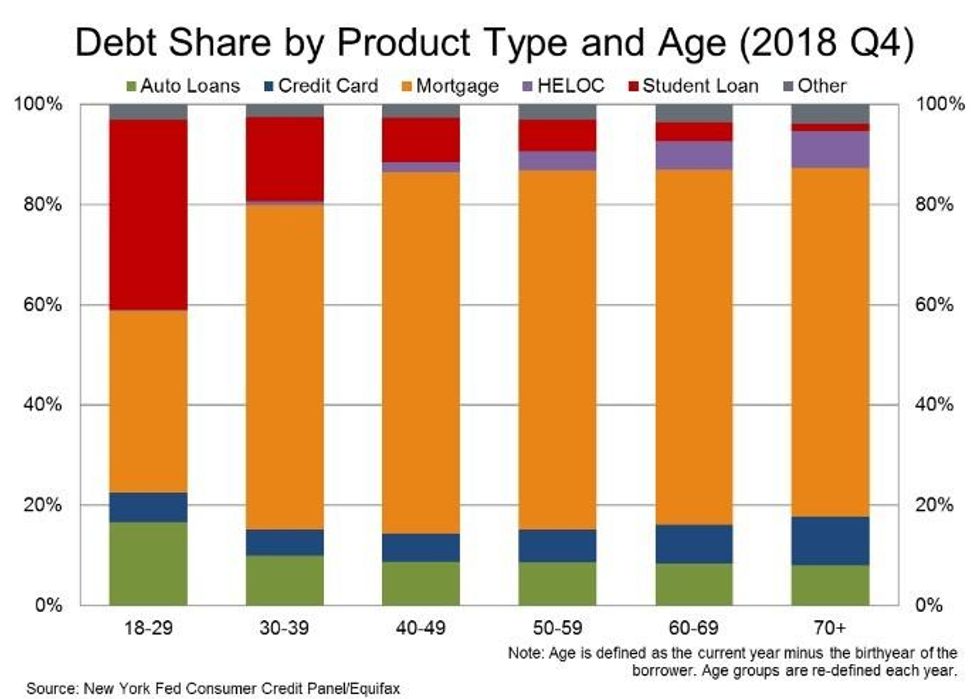

SUBSCRIBE TO OUR FREE NEWSLETTER
Daily news & progressive opinion—funded by the people, not the corporations—delivered straight to your inbox.
5
#000000
#FFFFFF
To donate by check, phone, or other method, see our More Ways to Give page.


Daily news & progressive opinion—funded by the people, not the corporations—delivered straight to your inbox.

"Student debt is at a crisis level in this country," said Sen. Kirsten Gillibrand (D.N.Y.). (Photo: thisisbossi/Flickr/cc)
Underscoring the need for progressive proposals like tuition-free college and debt relief, new data shows young Americans are being crushed by debt.
In the last quarter of 2018, outstanding student loan debt went up $15 billion to $1.46 trillion. Credit card balances shot up as well, raising $26 billion to $870 billion, according to (pdf) the most recent quarterly housefold debt report from the Federal Reserve Bank of New York's Center for Microeconomic Data.
The youngest age bracket in the report, those aged 19-29, had over $1 trillion in debt in 2018. "That's the highest debt exposure for the youngest adult group since late 2007," Bloomberg reported. Moreover, "Student loans make up the majority of the $1,005,000,000,000 owed by this cohort, followed by mortgage debt," the reporting adds.
"We are crushing the next generation with debt," tweeted Democratic presidential hopeful and Universal Basic Income proponent Andrew Yang in response to the findings.


In a tweet last week, another Democratic 2020 contender, Sen. Kirsten Gillibrand (D.N.Y.), said, "Student debt is at a crisis level in this country, and it holds our whole economy down."
Among the roughly one in four Americans facing that crisis--a problem a bipartisan majority of Americans want Congress to do something about--is Melissa Haggerty, a Loyola University Chicago alumna.
Being "strapped with student loan debt," she recently wrote that she's "barely getting by, and looking for solutions from lawmakers." She added:
In cities across Illinois, borrowers are putting 10 percent or more of their paychecks towards paying down student loan debt. The consequences of this means financial stability will continue to be out of reach for young people like me unless bold policies are implemented that make college more affordable for future students, and provide meaningful relief to borrowers like me. In Illinois, borrowers now have a Student Loan Bill of Rights, which provides basic consumer protections to defend them against bad practices by student loan companies. But we need to go further. Incoming policymakers should hold greedy student loan lenders accountable for their deceptive practices, and consider debt forgiveness programs for current borrowers. Borrowers should also be allowed to file for bankruptcy. Saddled with tens of thousands of student loans, filing for bankruptcy would be a welcome relief.
"It's time our policymakers take these challenges seriously, and offer meaningful solutions to help borrowers get ahead," she concluded.
Dear Common Dreams reader, The U.S. is on a fast track to authoritarianism like nothing I've ever seen. Meanwhile, corporate news outlets are utterly capitulating to Trump, twisting their coverage to avoid drawing his ire while lining up to stuff cash in his pockets. That's why I believe that Common Dreams is doing the best and most consequential reporting that we've ever done. Our small but mighty team is a progressive reporting powerhouse, covering the news every day that the corporate media never will. Our mission has always been simple: To inform. To inspire. And to ignite change for the common good. Now here's the key piece that I want all our readers to understand: None of this would be possible without your financial support. That's not just some fundraising cliche. It's the absolute and literal truth. We don't accept corporate advertising and never will. We don't have a paywall because we don't think people should be blocked from critical news based on their ability to pay. Everything we do is funded by the donations of readers like you. Will you donate now to help power the nonprofit, independent reporting of Common Dreams? Thank you for being a vital member of our community. Together, we can keep independent journalism alive when it’s needed most. - Craig Brown, Co-founder |
Underscoring the need for progressive proposals like tuition-free college and debt relief, new data shows young Americans are being crushed by debt.
In the last quarter of 2018, outstanding student loan debt went up $15 billion to $1.46 trillion. Credit card balances shot up as well, raising $26 billion to $870 billion, according to (pdf) the most recent quarterly housefold debt report from the Federal Reserve Bank of New York's Center for Microeconomic Data.
The youngest age bracket in the report, those aged 19-29, had over $1 trillion in debt in 2018. "That's the highest debt exposure for the youngest adult group since late 2007," Bloomberg reported. Moreover, "Student loans make up the majority of the $1,005,000,000,000 owed by this cohort, followed by mortgage debt," the reporting adds.
"We are crushing the next generation with debt," tweeted Democratic presidential hopeful and Universal Basic Income proponent Andrew Yang in response to the findings.


In a tweet last week, another Democratic 2020 contender, Sen. Kirsten Gillibrand (D.N.Y.), said, "Student debt is at a crisis level in this country, and it holds our whole economy down."
Among the roughly one in four Americans facing that crisis--a problem a bipartisan majority of Americans want Congress to do something about--is Melissa Haggerty, a Loyola University Chicago alumna.
Being "strapped with student loan debt," she recently wrote that she's "barely getting by, and looking for solutions from lawmakers." She added:
In cities across Illinois, borrowers are putting 10 percent or more of their paychecks towards paying down student loan debt. The consequences of this means financial stability will continue to be out of reach for young people like me unless bold policies are implemented that make college more affordable for future students, and provide meaningful relief to borrowers like me. In Illinois, borrowers now have a Student Loan Bill of Rights, which provides basic consumer protections to defend them against bad practices by student loan companies. But we need to go further. Incoming policymakers should hold greedy student loan lenders accountable for their deceptive practices, and consider debt forgiveness programs for current borrowers. Borrowers should also be allowed to file for bankruptcy. Saddled with tens of thousands of student loans, filing for bankruptcy would be a welcome relief.
"It's time our policymakers take these challenges seriously, and offer meaningful solutions to help borrowers get ahead," she concluded.
Underscoring the need for progressive proposals like tuition-free college and debt relief, new data shows young Americans are being crushed by debt.
In the last quarter of 2018, outstanding student loan debt went up $15 billion to $1.46 trillion. Credit card balances shot up as well, raising $26 billion to $870 billion, according to (pdf) the most recent quarterly housefold debt report from the Federal Reserve Bank of New York's Center for Microeconomic Data.
The youngest age bracket in the report, those aged 19-29, had over $1 trillion in debt in 2018. "That's the highest debt exposure for the youngest adult group since late 2007," Bloomberg reported. Moreover, "Student loans make up the majority of the $1,005,000,000,000 owed by this cohort, followed by mortgage debt," the reporting adds.
"We are crushing the next generation with debt," tweeted Democratic presidential hopeful and Universal Basic Income proponent Andrew Yang in response to the findings.


In a tweet last week, another Democratic 2020 contender, Sen. Kirsten Gillibrand (D.N.Y.), said, "Student debt is at a crisis level in this country, and it holds our whole economy down."
Among the roughly one in four Americans facing that crisis--a problem a bipartisan majority of Americans want Congress to do something about--is Melissa Haggerty, a Loyola University Chicago alumna.
Being "strapped with student loan debt," she recently wrote that she's "barely getting by, and looking for solutions from lawmakers." She added:
In cities across Illinois, borrowers are putting 10 percent or more of their paychecks towards paying down student loan debt. The consequences of this means financial stability will continue to be out of reach for young people like me unless bold policies are implemented that make college more affordable for future students, and provide meaningful relief to borrowers like me. In Illinois, borrowers now have a Student Loan Bill of Rights, which provides basic consumer protections to defend them against bad practices by student loan companies. But we need to go further. Incoming policymakers should hold greedy student loan lenders accountable for their deceptive practices, and consider debt forgiveness programs for current borrowers. Borrowers should also be allowed to file for bankruptcy. Saddled with tens of thousands of student loans, filing for bankruptcy would be a welcome relief.
"It's time our policymakers take these challenges seriously, and offer meaningful solutions to help borrowers get ahead," she concluded.